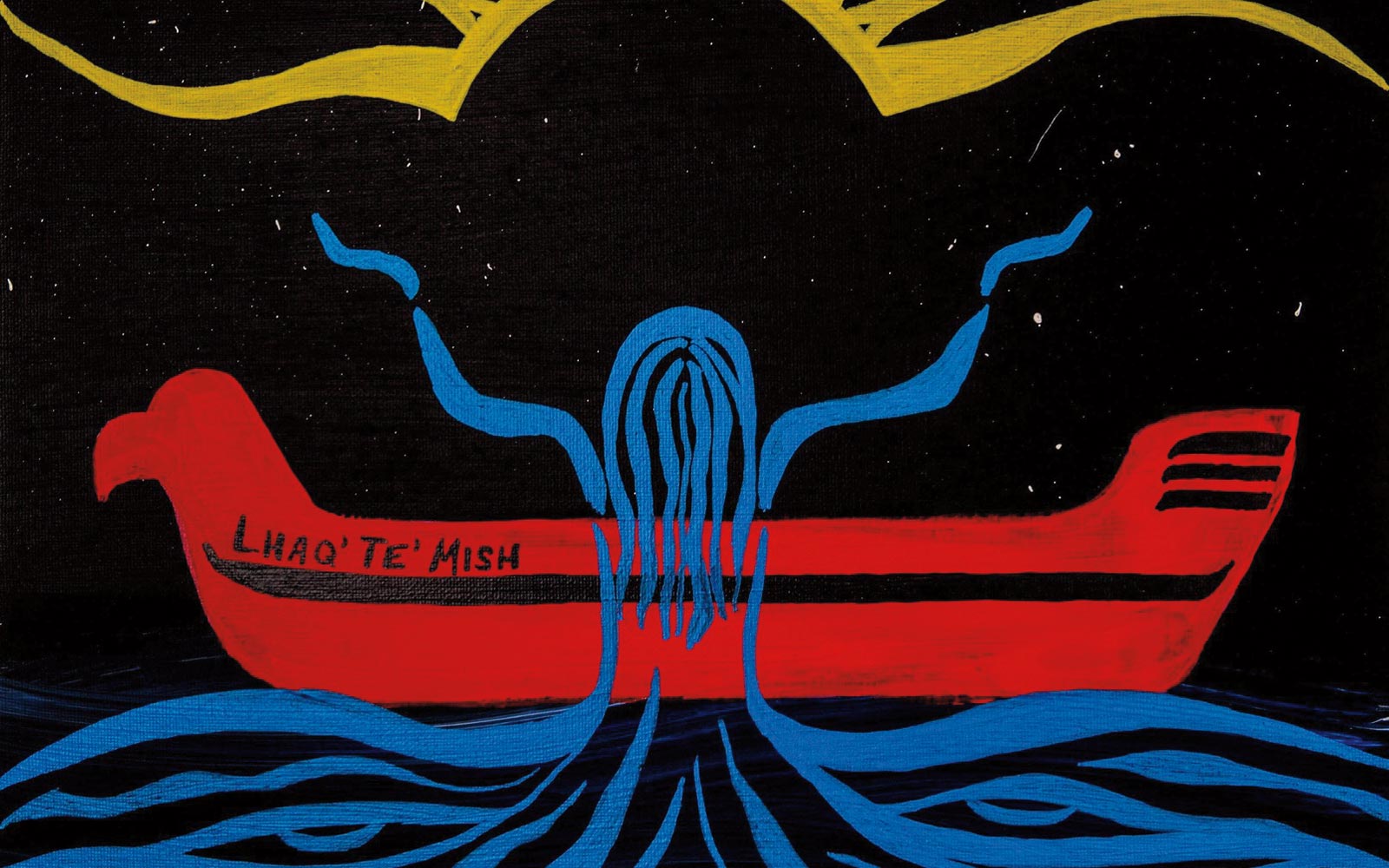Since Time Immemorial is a recurring series featuring community members whose families havebeen here since time immemorial. The ancestral knowledge carried by Lhaq’temish, Nooksack, and other Coast Salish peoples is knowledge about how to live in our shared home in a good, life-sustaining way. We live in a time when we need to restore our relationship with Mother Earth and with one another. We are grateful for these stories, told in the words of each featured individual.
This month, in a bit of a departure, we are featuring Sk’aliCh’elh-tenaut, who was also known as Tokitae or Lolita. Although she was a killer whale who was captive at the Miami Seaquarium for decades, she was also an important part of the Lhaq’temish community. Lummi tribal member Tah-Mahs Ellie Kinley has worked for years advocating for Sk’aliCh’elh-tenaut. In this work, Ellie has often shared that ancestral teachings hold that killer whales, in general, are simply humans who put on killer whale regalia in order to live under water, and that the Southern Residents, in particular, are members of the Lhaq’temish family. Both Southern Resident and Lhaq’temish societies are matriarchal, depend on salmon, and call the Salish Sea home. For both, families are sacred.
“We mirror each other,” Ellie says. “We are taught, ‘What happened to them, happens to us.’” The Lummi language term for orca is qwe’lhol’mechen, meaning “our relation under the waves.” Like the Lhaq’temish and other Coast Salish peoples, the Southern Resident orcas have been here since time immemorial.
Jim Washington, who sits on the Lummi Indian Business Council, explains, “Qwe’lhol’mechen are our elders. They showed us the way. They taught us how to hunt. They showed us how to stay together, how to be family.”
Sk’aliCh’elh-tenaut was stolen from her L-pod family in 1970, when she was likely 3 to 6 years old. This was during
the killer whale capture era, when as many as one-third of the Southern Residents were violently taken from their families and sold to aquariums, effectively erasing an entire generation. The late beloved hereditary Chief Tsilixw Bill James of Lummi Nation compared this capture era to the boarding school era, when Native children were likewise
stolen from their families, sent away, and denied their languages, cultures, relations, and homelands. Like captured
qwe’lhol’lmechen, many of those human children were abused, many died, many never came back home.
For over fifty years, twice a day, every day, Sk’aliCh’elh-tenaut performed for visitors to the Miami Seaquarium. It was as a showgirl that she was called “Lolita.” Her trainers, caretakers, and the activists who rallied for her freedom called her “Tokitae,” or “Toki” for short. This Chinook jargon word meaning “nice day, pretty colors,” had been given to her shortly after she was captured. The late Tsilixw gave her the Lummi name Sk’aliCh’elhtenaut, after the ancestral village of Sk’ali, close to the place of her capture at Penn Cove on Whidbey Island.
One of the ways that Southern Resident orcas communicate is by singing. As a baby and young child, Sk’aliCh’elh-tenaut was taught the L-pod family song by her mother. Even in captivity, she continued to sing this song.
Lummi elder Shirley Bob tells a story of recent visit to the Miami Seaquarium, when she went to hold a healing ceremony for and with Sk’aliCh’elh-tenaut: “When I sang to her, she went down, and she came up. She went up in the air like that and she splashed, and she got me all wet! And she comes and looks at me, and the caretaker said, ‘She knew you, she knows the connection between you and her.’”
Sk’aliCh’elh-tenaut was described by those who knew her best as sweet, affectionate, agreeable, and unusual in her ability to survive circumstances that others did not.
In 2017, Lummi Nation began working to bring Sk’aliCh’elh-tenaut– their relation– out of captivity and back home to the Salish Sea, where her mother still swims today. In an unprecedented collaboration, Lummi tribal members worked with a number of activists, non-profits, philanthropists, politicians, and eventually the Miami Seaquarium, on a plan to safely and responsibly bring her home. Sk’aliCh’elh-tenaut was active, healthy, and playful; the plan was fully financed; all the complicated logistics were aligning when, in August of 2023, suddenly and unexpectedly, Sk’aliCh’elh-tenaut passed away in her tank at the Miami Seaquarium.
Lummi Nation then called for the return of her ashes, so that she could be laid to rest in the Salish Sea. Lummi Youth Council President Damien Kamkoff has said, “She’s still coming home. Maybe not in the way we wanted, but she’s coming home.”
Sk’aliCh’elh-tenaut was always more than one whale: she carried many meanings, teachings, and stories. She was an avatar of healing. She carried hope, she carried the possibility of righting an old wrong, of heeding Native calls to action, of beginning to get back into the right, reciprocal relationship with the natural world.
Anthony Hillaire, Chairman of the Lummi Nation, has said, “A great leader brings everyone together. She was a great leader.”
This poem written by Jay Julius, founder and President of the non-profit Se’Si’Le and former Chairman of Lummi Nation, and by his daughter Teja Julius, was read aloud during a celebration of Sk’aliCh’elh-tenaut’s life held this past August by Lummi Nation.
I am the spirit of family and
community… look around you.
I am the spirit of Salmon…
this is how we live on.
I am the spirit of struggle…
the newcomers just don’t know or understand.
I am the spirit of perseverance…
you and I never gave up.
I am the spirit of forgiveness…
but let’s not forget.
I am the spirit of healing…
see the truth in our story.
I am the spirit of Love…
continue to fight for our existence.
I am the spirit of the water…
the water is my “giver of life” and the Salish Sea is our Home.
I am the spirit of family…
let’s all come together as one.
I am the spirit of Hope…
I am HOME, despite all odds.
I am Sk’aliCh’elh-tenaut /
Tokitae / Lolita.
I am keeper of the Spirit.
About the Writer:
Julie Trimingham is grateful to make her home on traditional Lhaq’temish territory, and to work for the Sacred Lands Conservancy (SacredSea.org), an Indigenous-led 501c3 nonprofit organization dedicated to protecting the life, culture, and sanctity of the Salish Sea.




